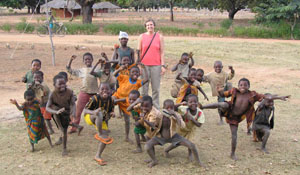« Washington Engineer - October 2005
Seats still available for 2005 Engineering Lecture Series
Purchase tickets for the lectures

- Former UW engineering student Kate Hulpke, center, with a group of new friends in Mozambique. The UW combines the resources of engineering and public administration to find ways to break logistical logjams that often stymie the efforts of international relief workers.
The 2005 Engineering Lecture Series, Engineering the Unexpected, focuses on how UW engineers are taking the lead in designing ways to respond when disaster strikes. All lectures begin at 7 p.m. in Kane Hall, Room 110. Topics and dates are:
Nov. 1: Engineering Disaster Relief
In the first few days following the devastating tsunami in Southeast Asia, the huge influx of disaster relief efforts actually fed the chaos instead of reducing it. It's a common problem, one that Technical Communication Professor Mark Haselkorn is working to solve as leader of team studying such scenarios. He and former engineering student Kate Hulpke will take listeners on a recent journey to Africa where UW students are not only helping distribute aid, but are learning critical logistical coordination and communications skills as part of a new certificate program. They will also discuss Hurricane Katrina and the storm’s aftermath as it relates to relief efforts there.
Read a news release about the UW program.
Nov. 8: Engineering Detectives: Uncovering the Causes of Catastrophe
When catastrophe strikes, UW alum Larry Anderson's team is often called to the scene to determine why something failed and how to engineer solutions. Officials tapped his company, Exponent, when the World Trade Center collapsed and when the Bellingham pipeline exploded, looking for answers. Anderson will give an insider's view of the detective work that goes into failure analysis and how engineers use information gleaned to make the world safer.
Nov. 15: Saving Soldiers: Robots to the Rescue
On the battlefield of the future, medics won't be on the front lines, dodging bullets and shrapnel as they try to reach fallen soldiers to render aid. Instead, tough, high-tech robotic pods will do the job. That's the vision of a team of UW researchers in surgery and engineering – a vision that's quickly becoming reality. The first trial of a new surgical robot is scheduled for early next year on a mountainside in Hawaii.
Read a story about the Trauma Pod project
Reservations for the lectures are now available online through the UW Alumni Association. Questions? Call the association at (206) 543-0540.
The series is co-sponsored by the College of Engineering and the UW Alumni Association.
Centennial celebrations coming up for EE, ME
The college will celebrate the 100th birthdays of two engineering departments next year. Alumni and friends are welcome to return to campus on April 29 for Electrical Engineering's centennial events and next fall, on Sept. 15, Mechanical Engineering will celebrate its 100th birthday. Look for more details on the COE Web site.